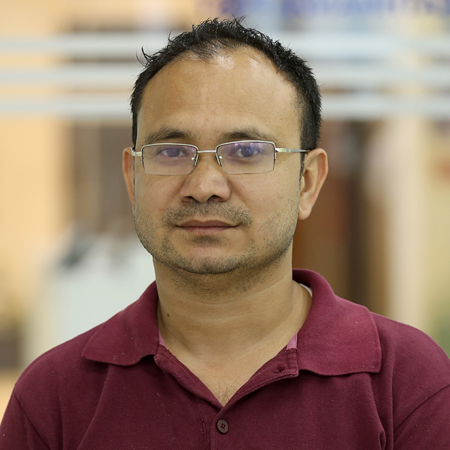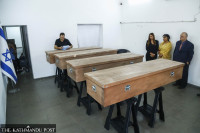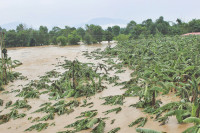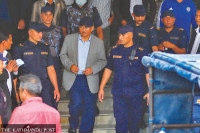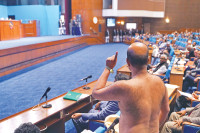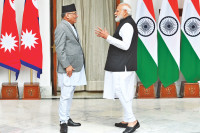Politics
Yearender 2023: Year of politically-charged scams
The prime minister is not genuinely committed to combatting corruption, and his rhetoric is merely lip service, anti-corruption activists say.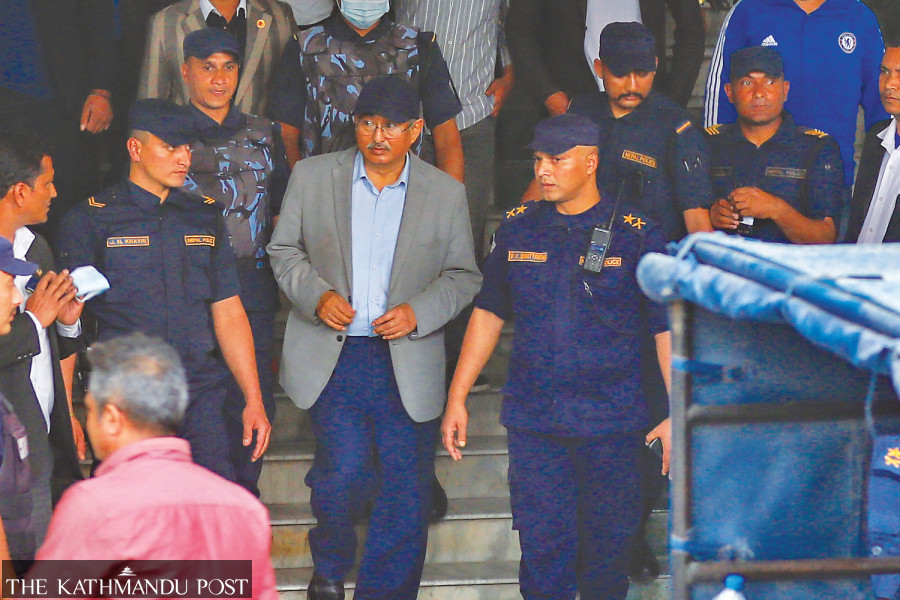
Prithivi Man Shrestha
2023 has been marked by a surge in sophisticated scams.
The country was rocked with three notorious scams—fake Bhutanese refugees, gold smuggling and the Lalita Niwas land grab.
The alleged involvement of top political leaders in these scams exposed how large-scale and organised corruption and financial irregularities have been taking place, promoted, and protected by the powerful political leaders.
On May 24, the District Attorney Office Kathmandu filed criminal cases at the District Court Kathmandu against 30 individuals, including former deputy prime minister Top Bahadur Rayamajhi and former home minister Bal Krishna Khand, accusing their involvement in the fake Bhutanese refugee scam.
Indrajeet Rai, security advisor to former home minister Ram Bahadur Thapa, suspended government secretary Tek Narayan Pandey, former lawmaker Ang Tawa Sherpa, Bhutanese human rights leader Tek Nath Rijal, Rayamajhi’s son Sandeep were other big names prosecuted in the case.
The attorney's office said they have been charged with four types of crimes—treason, organised crime, fraud and forgery.
They have been charge-sheeted for collecting Rs288.17 million from 115 victims—ranging from Rs150,000 to Rs4.8 million—on the promise of sending them to the US as Bhutanese refugees.
On August 27, the District Attorney Office, Kathmandu prosecuted 310 individuals including former deputy prime minister Bijaya Kumar Gachhadar; former ministers Chandra Deo Joshi, Dambar Bahadur Shrestha and Chhabi Raj Pant; and former minister of state Sanjay Sah for their involvement in forgery of the government documents in the infamous Lalita Niwas land grab scam.
The majority of them already face corruption cases filed by the Commission for Investigation of Abuse of Authority in court.
On September 17, the District Attorney Office, Kathmandu filed a case against 29 people, including many Chinese nationals at the District Court, Kathmandu, for their alleged involvement in the smuggling of 60kg of gold in July.
Prime Minister Pushpa Kamal Dahal boasted of the investigation and subsequent prosecution of several people including senior political leaders of the ruling and opposition parties in these scams as a big success of his government.
“A VIP culture was being established and a narrative was building among the masses that high-profile people could not be brought under the net of law,” Prime Minister Dahal commented while addressing the nation on December 26.
“People’s confidence towards democracy has been enhanced after the government conducted the biggest investigation and prosecution in history in the scams related to fake Bhutanese refugees Lalita Niwas and smuggling of gold via Tribhuvan International Airport.”
According to Dahal, the high-profile individuals who seemed to be beyond the reach of the law were brought under the net of the law. “The government made every effort to uphold the rule of law.”
Critics, however, argue that while investigating these incidents was a step in the right direction, a number of key figures having political clout have managed to evade the legal net.
“In the Bhutanese refugee scam, even senior leaders from both the ruling as well as the opposition parties were prosecuted, which is praiseworthy,” says Khem Raj Regmi, former secretary and former chairman of Transparency International Nepal, an anti-corruption group.
“There has been a weakness right from the beginning. In 2019, a task force was formed under then joint secretary Bal Krishna Panthi,” he said. “The effectiveness of the task force came under question. In this context, those who formed the task force should also be subject to investigation.”
Insiders say these scams exposed how politicians and other people in power misused their authority to carry out these scams.
Even though they praised the investigations and prosecution of powerful politicians, they also questioned the exclusion of certain politicians from being prosecuted.
“Even if there is a wide investigation on all those scams, I don’t think any conclusion will come and the people involved in the scams will be jailed,” says Professor Chaitanya Mishra, a leading sociologist.
In 2016, the United Nations High Commissioner for Refugees (UNHCR) announced the cessation of the resettlement programme of the Bhutanese refugees, which started in 2007, after the resettlement of 113,500 refugees in eight Western countries.
Of them, the United States alone received more than 90,000.
In 2019, the then government led by KP Sharma Oli formed the task force under Panthi to recommend ways to manage the Bhutanese refugees, who remained in Nepal after the third-country resettlement programme ended.
The task force submitted the report by including 429 Bhutanese refugees who had been left behind. Later, the racketeers, in collusion with some top officials, prepared another report deceitfully adding hundreds of others aspiring to resettle abroad to the list of Bhutanese refugees, according to the charge sheet.
UML Chairman KP Sharma Oli’s former advisor Ajaya Kranti Shakya allegedly received Rs10 million, as per the statement given by a defendant to the police.
But Shakya was not questioned by the police.
“Some people were prosecuted merely because they were implicated by others, while certain accused individuals were not questioned. This raises questions about possible political influence in the decisions,” says Gauri Bahadur Karki, former chairperson of the Special Court.
In a 9-kg gold smuggling scam that took place in December last year, followed by another 60-kg smuggling case in July this year, Rahul Mahara, son of former speaker Krishna Bahadur Mahara was found to have made several contacts with the members of a Chinese smuggling racket.
Police had earlier found that Daojin Wang, who has been charge-sheeted in a separate 9 kg gold smuggling case, had multiple contacts with former Speaker Mahara, who is also the vice-chairman of the ruling CPN (Maoist Centre), whose leader is the prime minister. Wang has been identified as one of the key members of the racket involved in the recent 60kg gold smuggling case.
Senior Mahara was inquired about the issue by the police, but without the presence of the government attorney, a vital step required to prosecute someone being probed for a criminal offence.
In a similar fashion, in the forgery accusation in the Lalita Niwas land grab case, police interrogated former prime ministers Baburam Bhattarai and Madhav Kumar Nepal without the presence of the government attorney.
“If somebody is expected to be a defendant in an offence, deposition (statement of potential offender) of such a person is taken [in the presence of government attorney]. Otherwise, the statement is recorded as evidence for the government, and the presence of a government attorney is not required,” an official at District Attorney, Kathmandu told the Post in August.
Regmi says that with a police investigation showing contacts between former Speaker Mahara and the Chinese racket, the government should have tried to prosecute him if it was serious about controlling corruption.
“We believe in strict implementation of the law. But, we also have to admit that the government at least tried to bring certain politicians to book,” he says.
The heavy involvement of politicians in organised corruption is not a new trend in Nepal. “Therefore it is a common interest among all parties and they forge a union for kleptocracy, thus making anti-corruption work impossible in Nepal,” says Narayan Adhikari, co-founder and director at Accountability Lab, a non-governmental organisation working in the field of accountability, transparency and open government.
Despite the prosecution of former home minister Khand, the ruling Nepali Congress failed to suspend him from the party, at least until the court issued a verdict on the matter, raising questions about the commitment of the largest party against corruption.
Many press reports suggest that the former Prime Minister Sher Bahadur Deuba has been enraged with Deputy Prime Minister and Home Minister Narayan Kaji Shrestha for the prosecution of Nepali Congress leaders, including Khand and has sought Shrestha’s removal from the cabinet.
On the other hand, the ruling CPN (Maoist Centre) continued to stand by Mahara despite several controversies about his conduct over the years, including his infamous tape scandal where he solicited funds from a Chinese national.
“The prime minister is not serious about the real fight against corruption. His rhetoric has been proven to be mere lip service,” Adhikari says.
Experts say that the lack of a government with a strong people’s mandate also affected governance.
Currently, the government is being led by the distant third-largest party as people elected a hung parliament in last year’s parliamentary elections.
“Corruption flourishes in transition, chaos and a strong nexus of organised crime,” Adhikari says. “Those involved in this nexus have the power to manipulate politics, governance and public policy.”
Mahara and Khand for example, are backed by their senior leaders, bureaucrats and business associates linked to foreign agents.
“When corruption becomes transnational, checking it becomes challenging,” Adhikari says.




 11.12°C Kathmandu
11.12°C Kathmandu